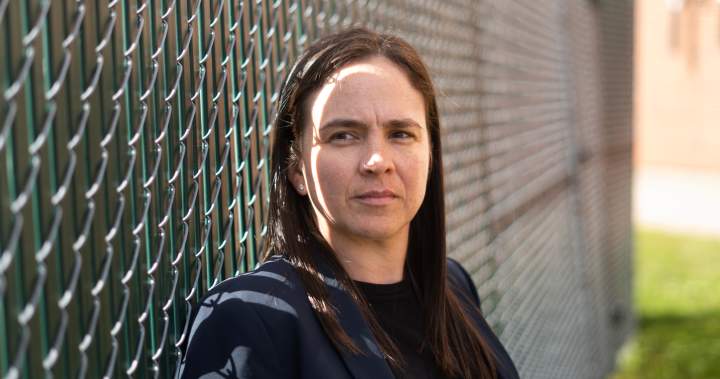Since the school year began, Diana Calderón has spent most weekend afternoons driving her 14-year-old daughter to the Halifax junior high school she should be attending, timing their visits with recess so the teenager can spend a few minutes with her classmates.
“I’m driving her so she can see her friends and talk to them during that time… we do this almost every day,” Calderón said.
“Sometimes we don’t go… when she says: ‘I don’t want to go today, I feel too sad,’” she said, adding that her daughter finds it painful to not be allowed in the classroom with her friends when recess ends.
The single mother said she’s been desperate to give her daughter moments of normalcy and time with her peers since their lives were ended in August.
Calderón, who is originally from Colombia and immigrated to Canada from Peru in 2022, said Immigration, Refugees and Citizenship Canada informed her on Aug. 6 that it had rejected her work permit, because her employer of about two years, Nova Scotia Health, did not pay a $230 compliance fee — a payment the provincial health authority says it paid.
“I thought I was going to faint. And then I saw there’s another letter for my daughter,” Calderón said in an interview Monday, holding back tears.
That letter, also sent from the federal department and directed to 14-year-old Sofia, said she was no longer permitted to study in the country because of her mother’s rejected work permit. Calderón and her daughter were given 90 days from the rejection, until Nov. 4, to go through the costly process of reapplying for a work permit, or be forced to leave the country.

Get breaking National news
For news impacting Canada and around the world, sign up for breaking news alerts delivered directly to you when they happen.
Jennifer Lewandowski, a spokesperson for Health Nova Scotia, said the health authority looked into the refused work permit in August and “it became clear that this was the result of a clerical error that needs to be fixed quickly.” Lewandowski said the health authority paid the fee in full on Dec. 12, 2024.
Calderón said she made numerous attempts to reach the federal immigration department to alert them to the error. She said she only received notice that her case was reopened, but no one from the federal department acknowledged to her that someone made a mistake.
Then, Monday evening, a government spokesperson sent a short email to The Canadian Press, saying Calderón’s work permit was now approved and valid until September 2027.
She and Lewandowski said they only learned this news during a phone call with The Canadian Press.
“I couldn’t believe it. I felt shock and so much relief,” Calderón said.
Despite the department’s new statement, when she checked the federal immigration portal on Tuesday, she said her application was still listed as “in process.”
Lewandowski said the health authority cannot invite Calderón back to work until she receives this confirmation from the federal government.
The federal department confirmed to The Canadian Press that Calderón’s application was refused in August, but did not respond to questions about why it indicated that her employer had not paid a fee, or why it wasn’t immediately able to respond to the request from Calderón and her lawyer. They didn’t say when she and her daughter would be allowed to resume work and school.
“We hope it doesn’t take long… I would have been at my desk this morning if I could,” said Calderón, who is a sourcing manager in the supply chain operations division of the provincial health authority.
The department also did not immediately respond to questions about whether they would provide Calderón with compensation for the six weeks of lost work or the cost of an immigration lawyer.
The mother has been relying on her savings to cover rent and other necessities.
As the sole provider for her and her daughter, Calderón said she “needs to work, and I want to work, but the most important thing to me is for my daughter to be able to go to school… that’s the most important thing to me.”
Calderón said she came to Nova Scotia in hopes of giving her daughter a stable place to learn and grow up.
While it remains unclear when their lives can go back to normal, Calderón said the relief since seeing IRCC’s response to media about her case gave her some peace of mind.
“Last night, I was able to sleep the whole night, not waking up at 1 am and 2 am and 3 am thinking about how I don’t know what’s going to happen with this,” she said.
After spending their first year in Canada in Ontario, Calderón and Sofia moved to Nova Scotia in July 2023, a province the pair “really love.”
Nova Scotians “are very nice people, that’s the first thing we love about it, and of course the landscape is breathtaking. The food is really good … and we came from a country where food is super important for us. And here, you have super delicious food. I love it,” she said.
“All we want is… to go back to work and for my daughter to go to school and keep contributing to the community.”
Read the full article here
